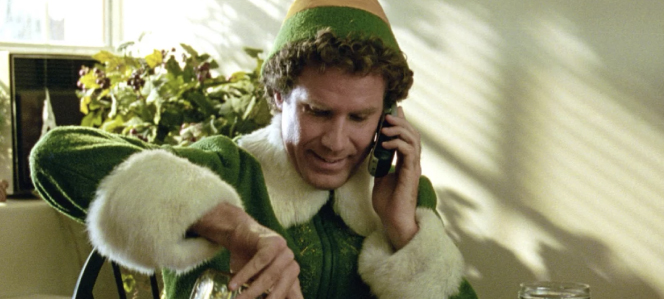He passed through the seven levels of the Candy Cane forest, through the sea of swirly twirly gum drops, and then he walked through the Lincoln Tunnel.
And every December, about three times a week and maybe twice on Sundays, I mouth the words and re-memorize my favorite lines as Buddy the Elf becomes my Christmas season vocabulary supplier and comedic inspiration. I find myself tempted to yell out “Great job everyone! It’s great to meet you” every time I walk out of the door of my local coffee shop; I have to fight back the urge to press every button when I am riding an elevator with fellow officemates; I reach for the box of pop tarts and the maple syrup when I make myself a bowl of breakfast spaghetti. Heaven forbid I meet a man named Francisco.
If you have not yet seen Elf, stop reading this post right now. Get a hold of yourself. Get your life in order.
If you have seen Elf and you hate it, stop being a cotton-headed ninny muggins.
If you are a civilized, well-balanced human being (i.e., you have seen the movie and have yelled out “SANTA!!! I KNOW him!” at least once this year), read on.
While there is doctoral dissertation material in that cinematic wonder, I want to concentrate on one underlying theme. Roll up your pant legs; it’s about to get deep.
Let’s begin by looking at a few vignettes: Buddy the Elf leaves the safe-haven of a land of candy, candy corn, candy canes, sugar, and non-stop present making to meet his naughty-listed father (Walter) in New York City. He encounters a rabid raccoon who needs a hug, jumps two-footed across the NYC crosswalk stripes, graciously accepts stacks of flyers from street corner solicitors, and gets excited about the department store passion fruit spray (before, of course, his excitement turns to horror).
Walter works for a publishing company focused on the bottom line. He recalls books from a school run by a 90-year-old nun late with her payment, approves the sale of defective children’s literature to save a little extra cash, consistently eats his dinner away from his family for the sake of his work, and drives a wedge between himself and his son in order to climb another rung on the corporate ladder.
The collision of worlds takes place in this modern fantasy—a literary genre that takes real-life circumstances and characters and introduces them into a world, imagined or exaggerated, where unexpected things happen— or vice-versa. Fantasy often personifies virtue and vice to teach a moral or theological lesson. And while Elf is not quite Lord of the Rings, its lesson is taught by the same technique.
Buddy’s life in New York, and the streaming plot of the movie, is characterized by his naïve, unadulterated, North Pole response to the rigors of a fast-paced, commercialized society that restricts ribbon curls to “six inches!” and has no time for tomfoolery. Delight, wonder, and wholesome joy, the kind that comes from staring at Christmas trees, circling through revolving doors, and cramming eleven cookies into the VCR—it’s a strange and somewhat annoying state of mind for the likes of the stereotypical businessman, the every-Walter. It is unproductive, and so it is useless. Walter is desensitized to wonder and delight, and for that reason, is increasingly prickly and incorrigible, creating his own hell on earth.
Enter the personified festival that is Buddy the Elf. The pursuit of goods meets real goodness, in the form of a six-foot-three elf who has had a beard since he was fifteen.
Granted, wearing yellow spandex and waving at people hailing taxis are not the solution for waning wonder and joy. Buddy’s naivete cannot be suffused in a post-naïve life, society, or world. The part of innocence that emerges from an ignorance of one’s ignorance cannot be pursued. It’s oxymoronic. But a submission to festivity—a willful surrender to joyful celebration—is a response rather than a feeling. However, it is a response that often gives way to feeling: joy, merriment, good cheer. It exposes the lie of happiness-promising materialism and instead elevates a reprioritization of values, a conversion of vision. Buddy’s starkly different worldview is presented in the context of cinematic fantasy, but it exemplifies a basic philosophical truth about what really matters when all is said and done.
In The Hobbit, a more well-known fantasy, J.R.R. Tolkien’s Thorin says to Bilbo on his deathbed, “If more of us valued food, cheer, and song above hoarded gold, it would be a merrier world.” Elf, the Christmas season, and Catholic spirituality propose that we don’t wait until our deathbeds to arrive at this realization. This time of year, submission to festivity is essential. The real party, however, is at the manger, not at Gimbel’s. The Christ-mass is the most joyful occasion we have yet encountered, and the Church’s liturgy is set up for a mighty celebratory feast.
I, for one, hope there’s candy, candy corn, candy canes, and syrup.
